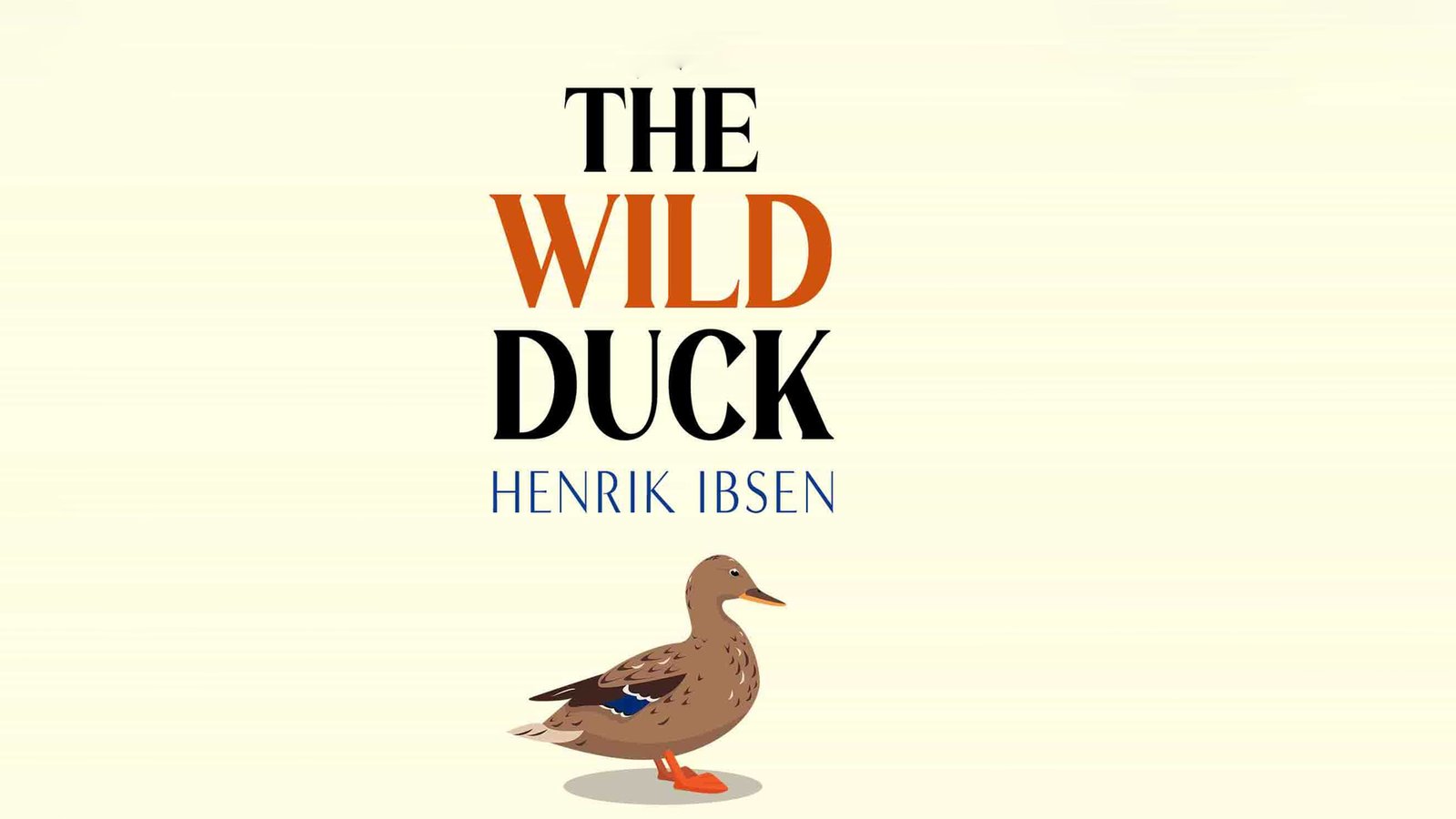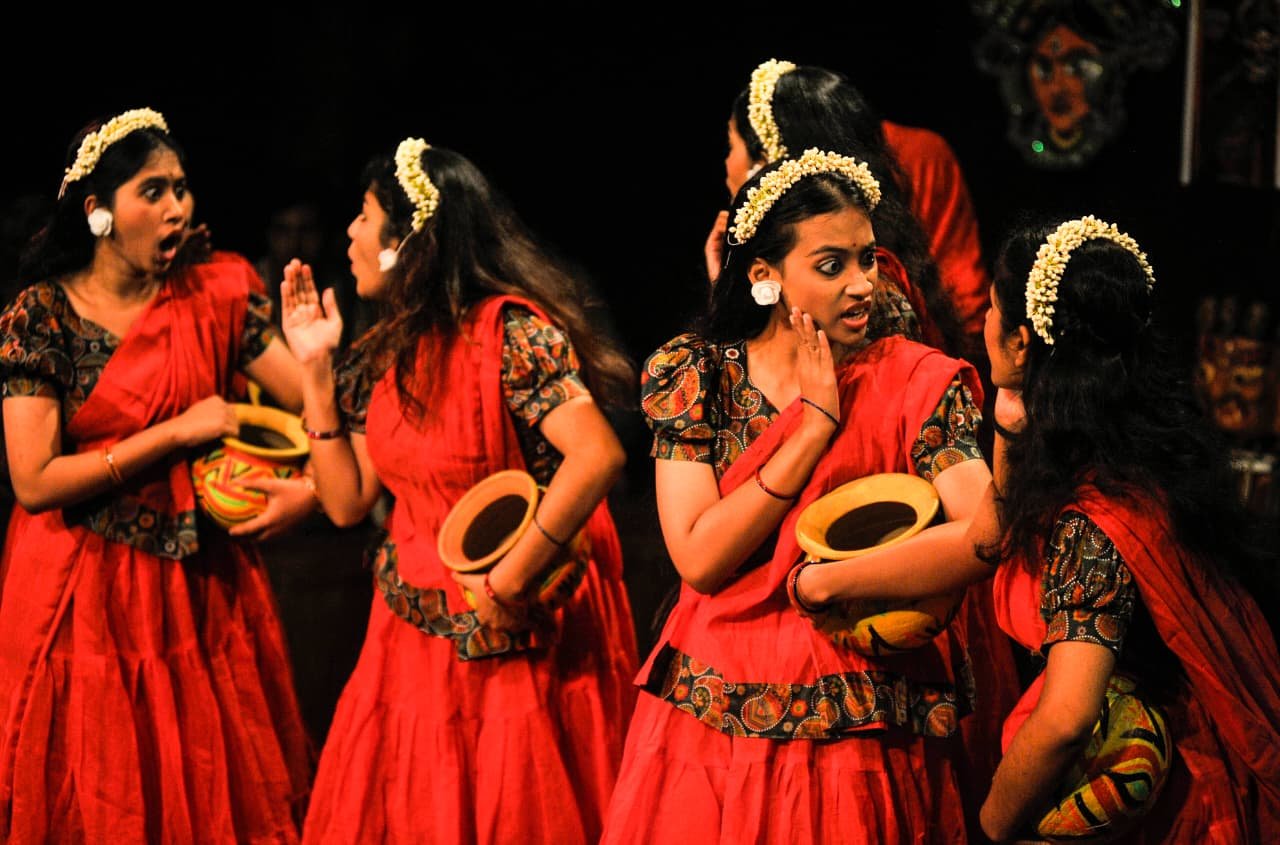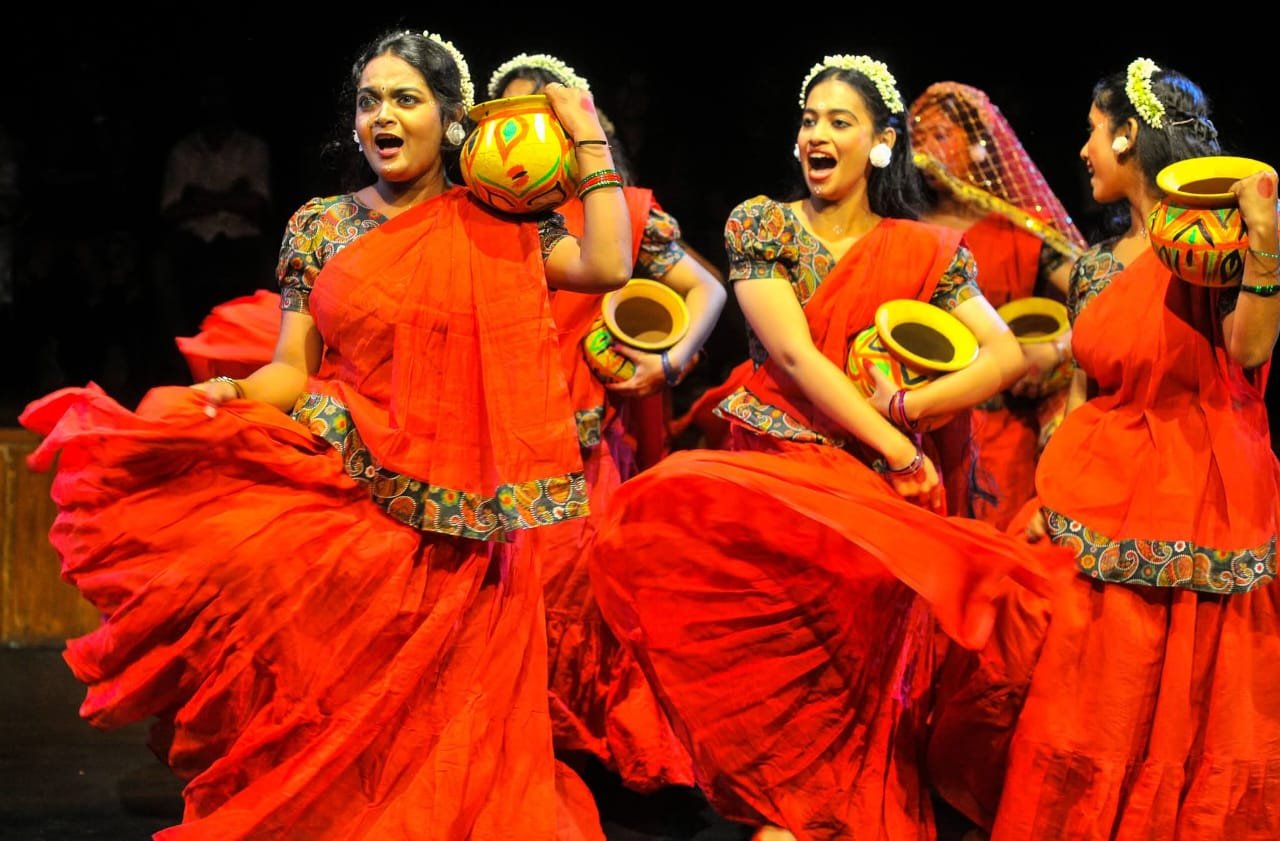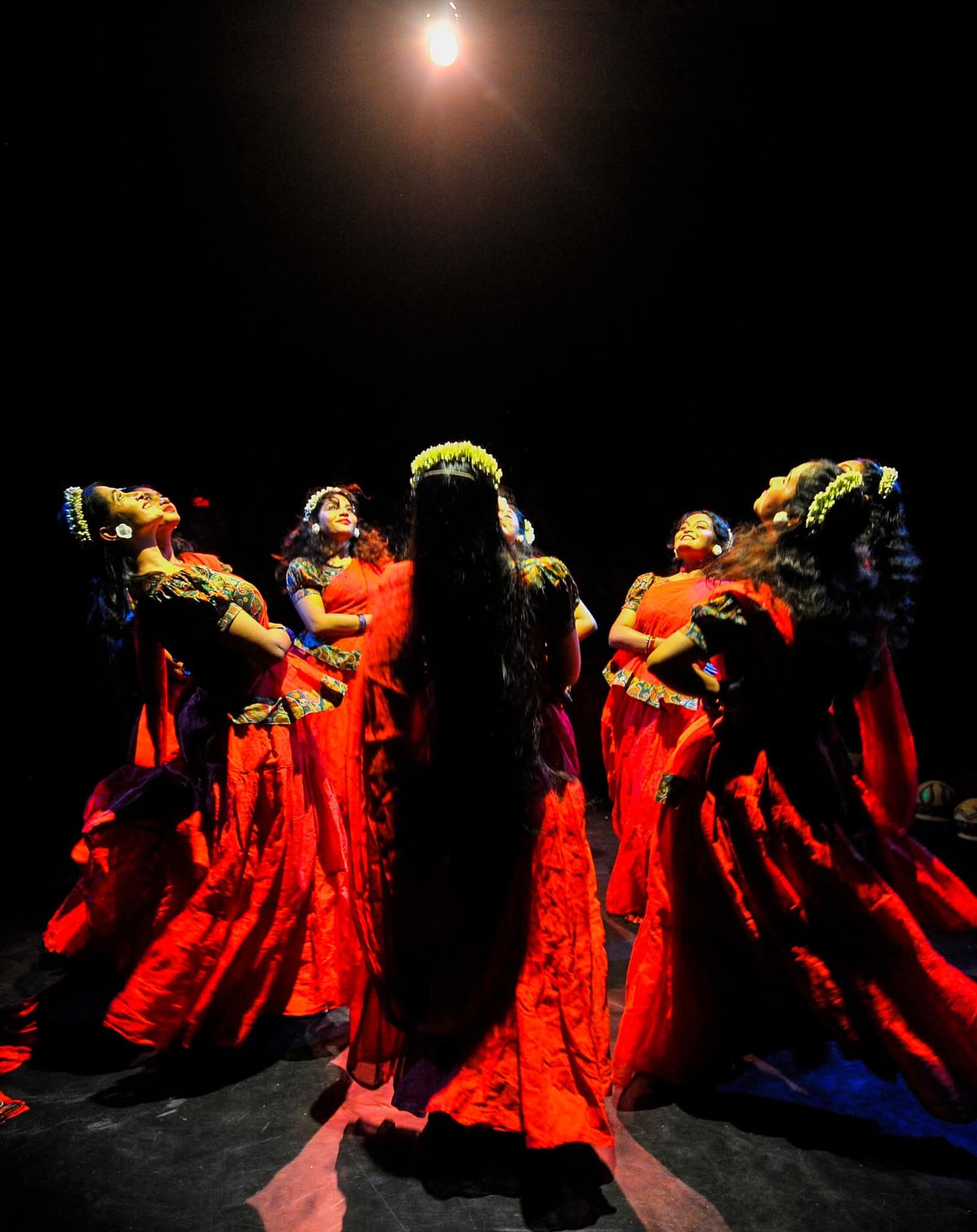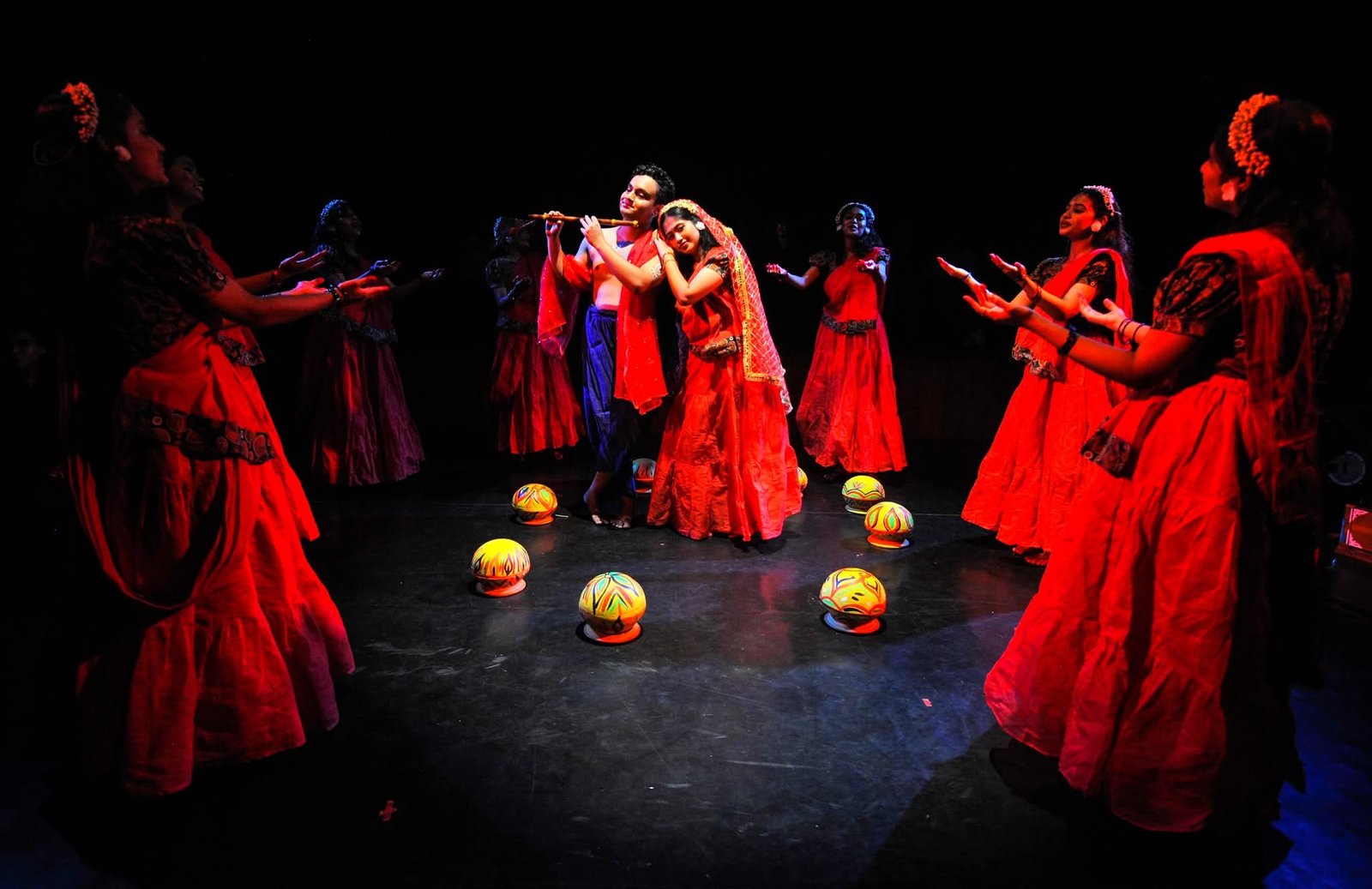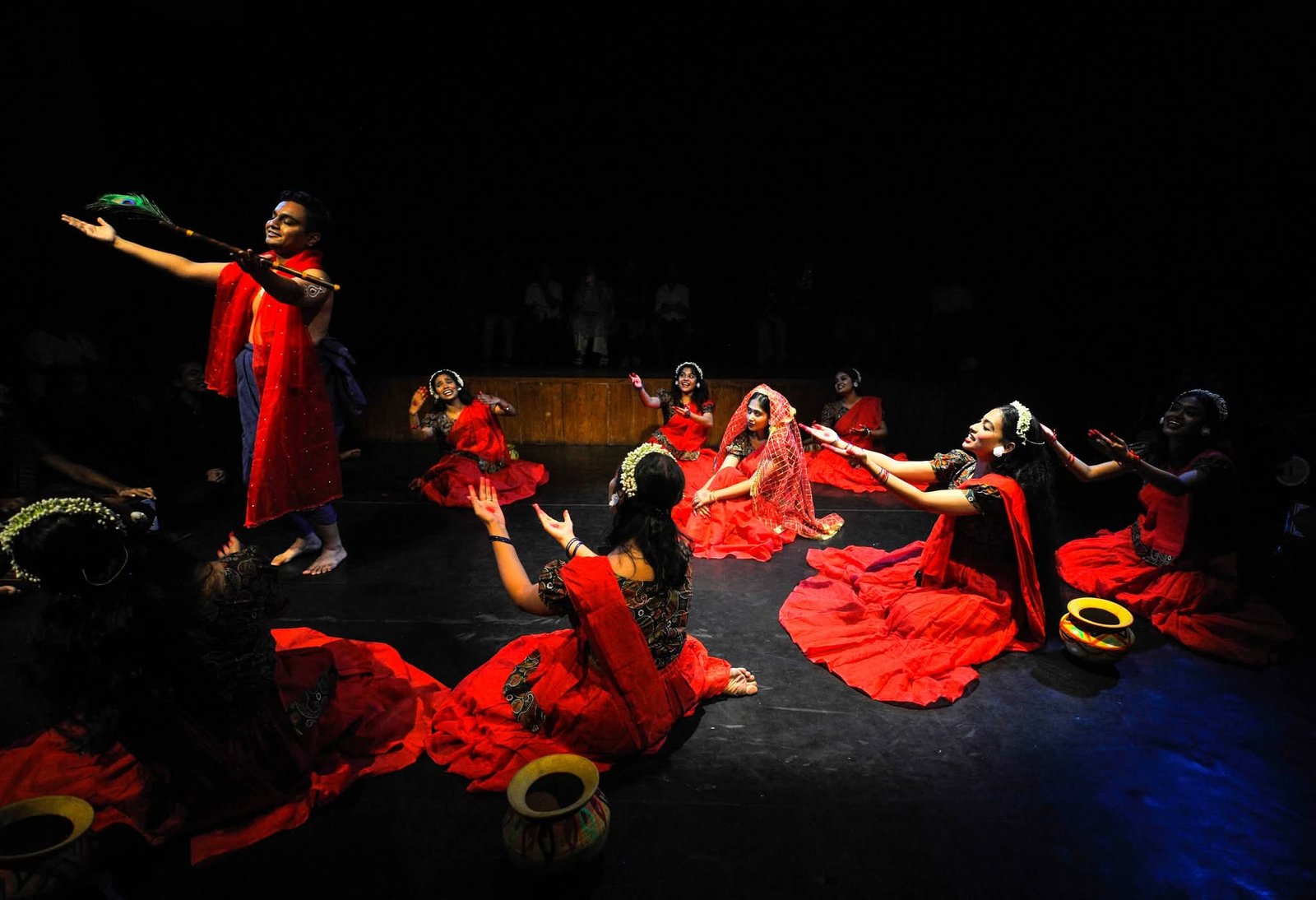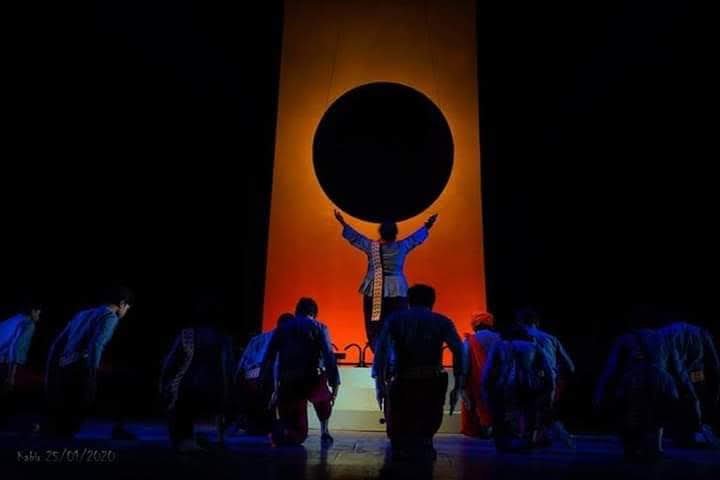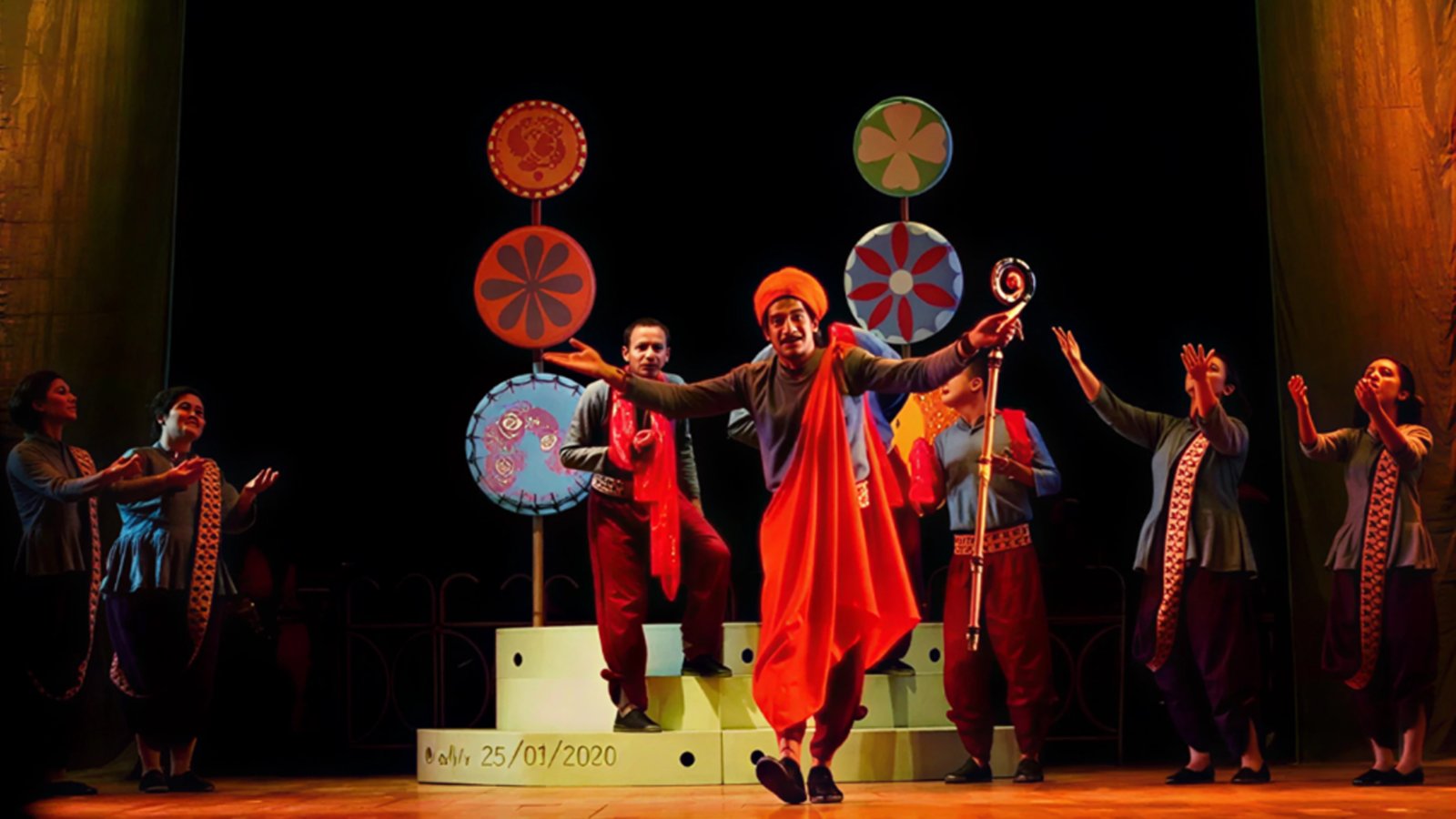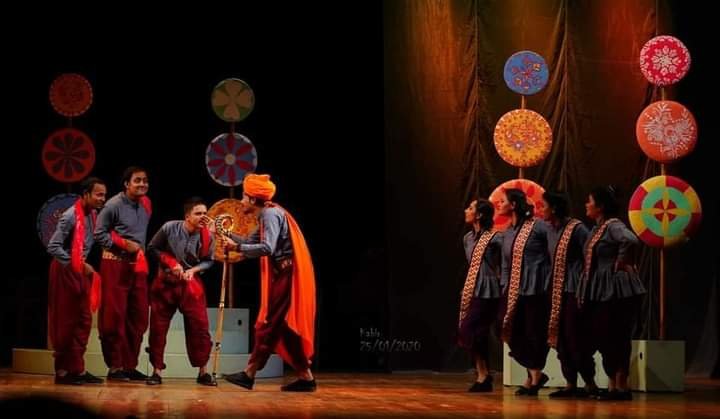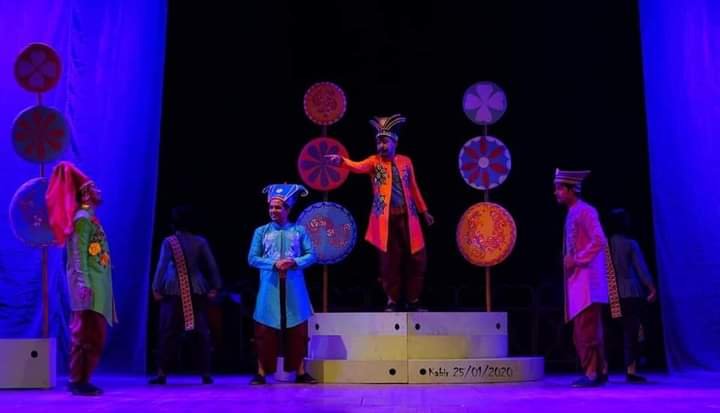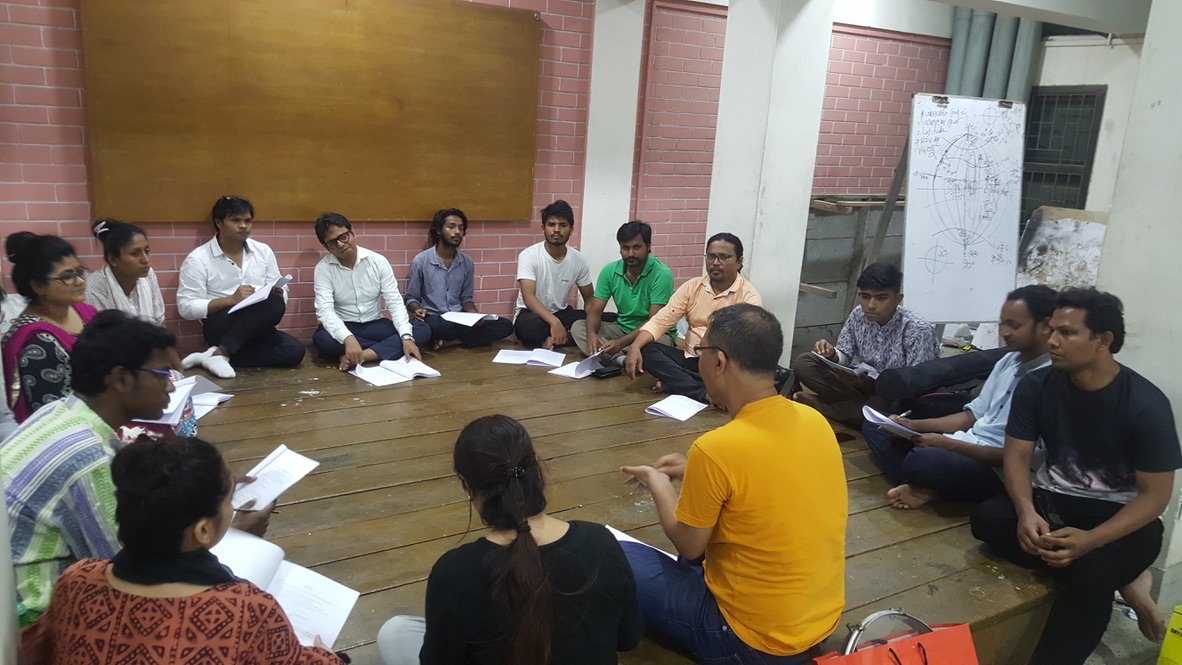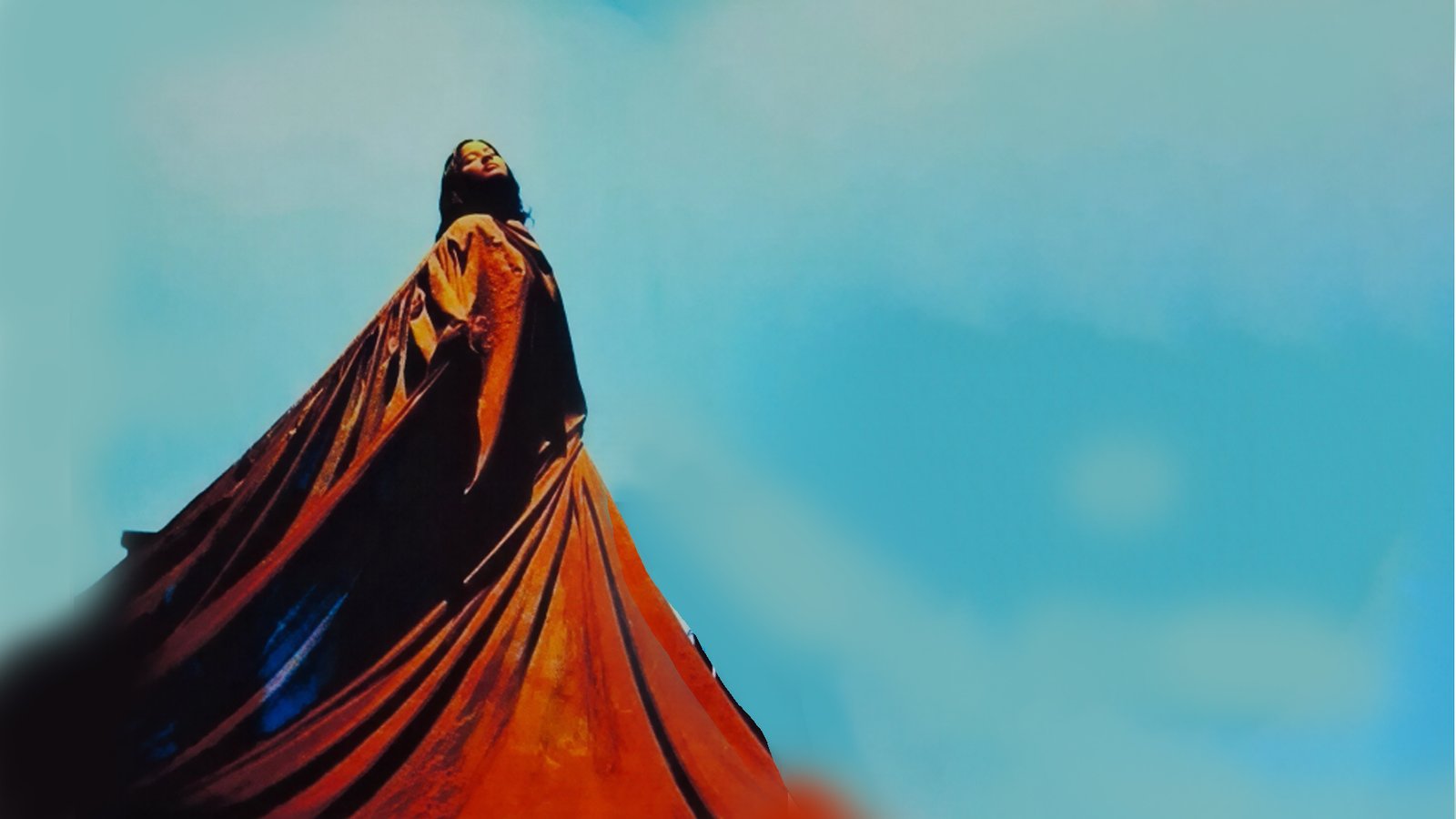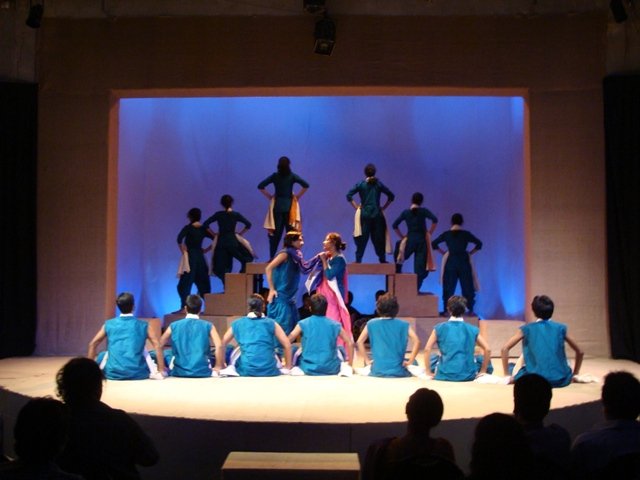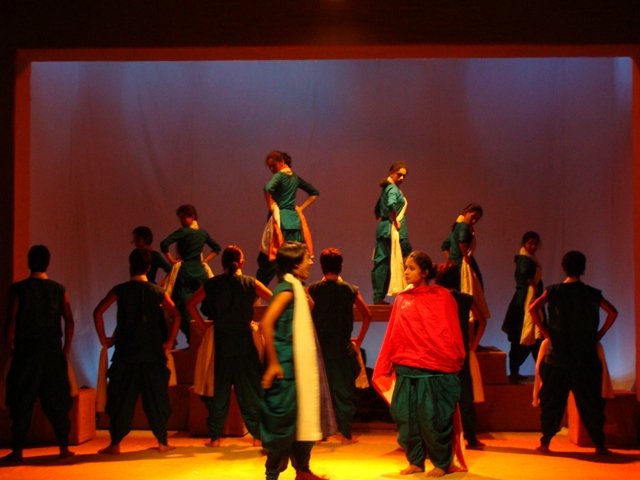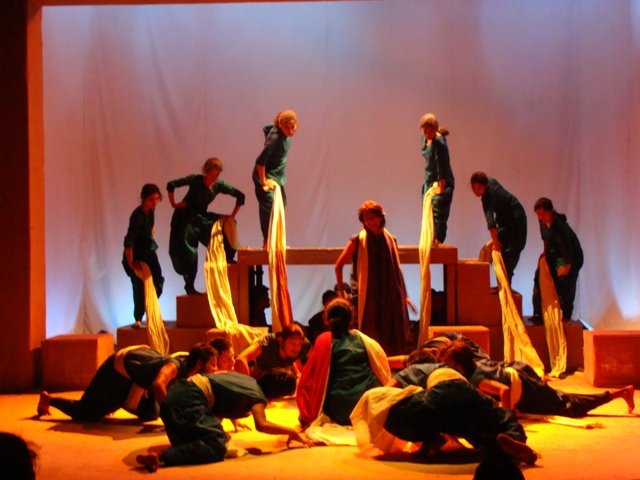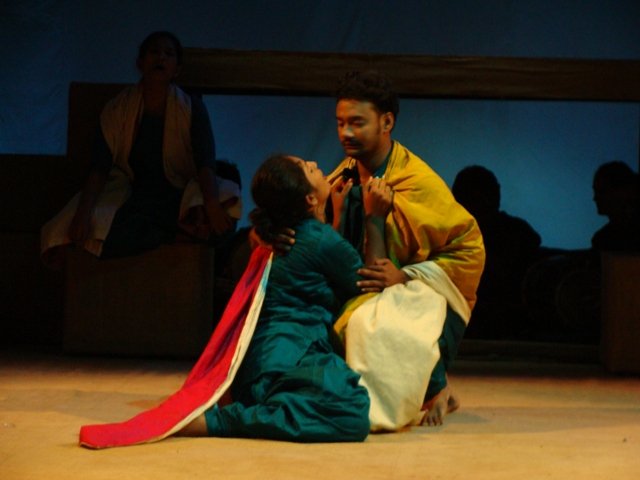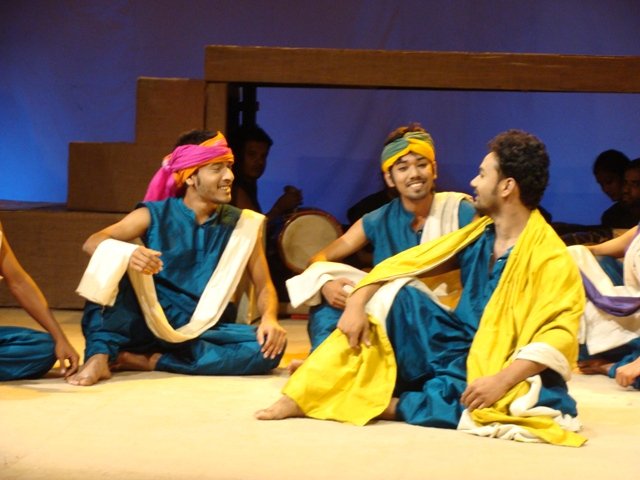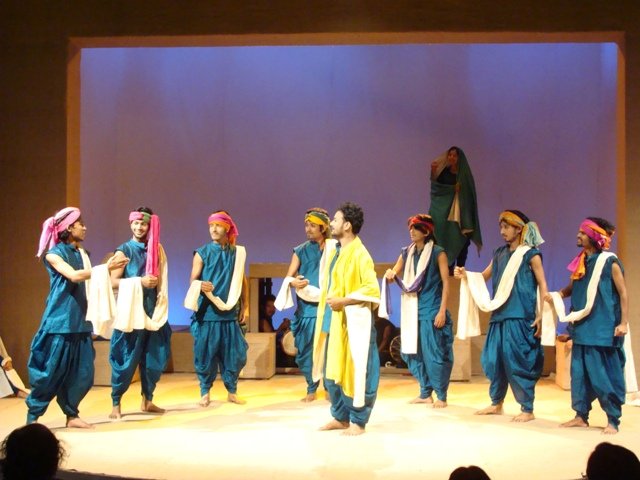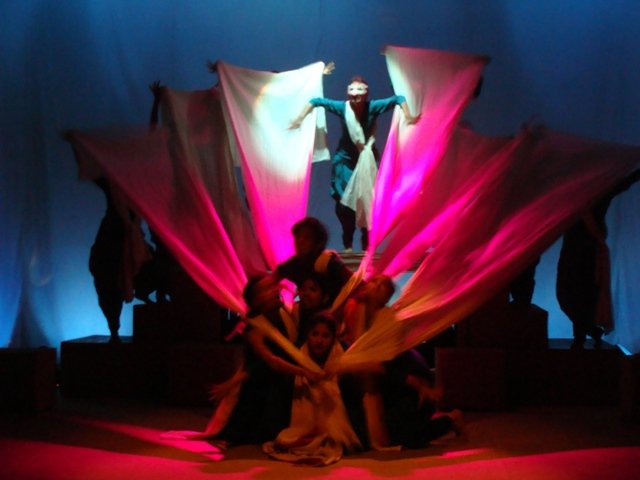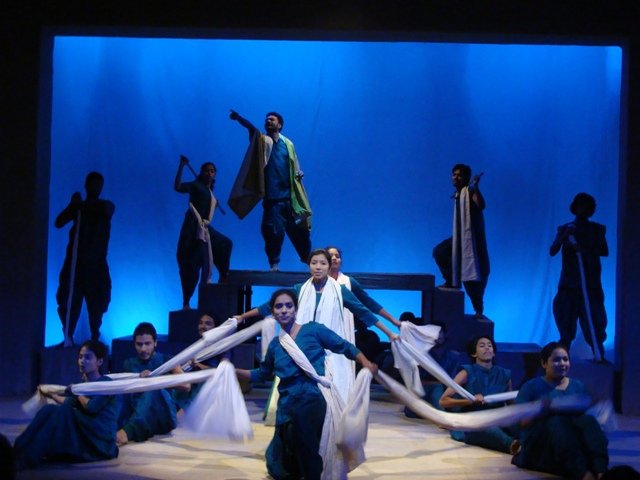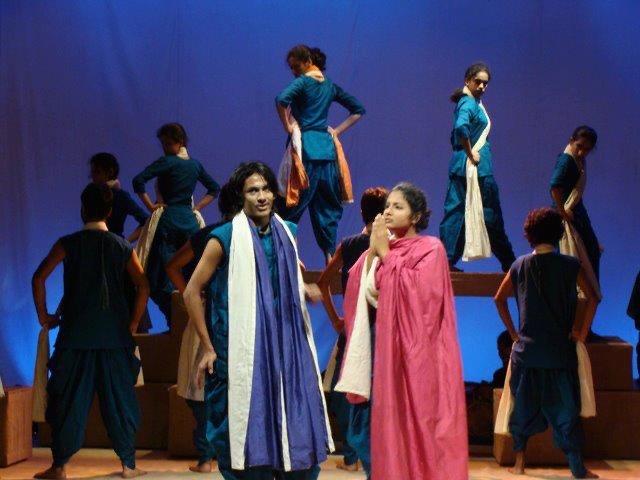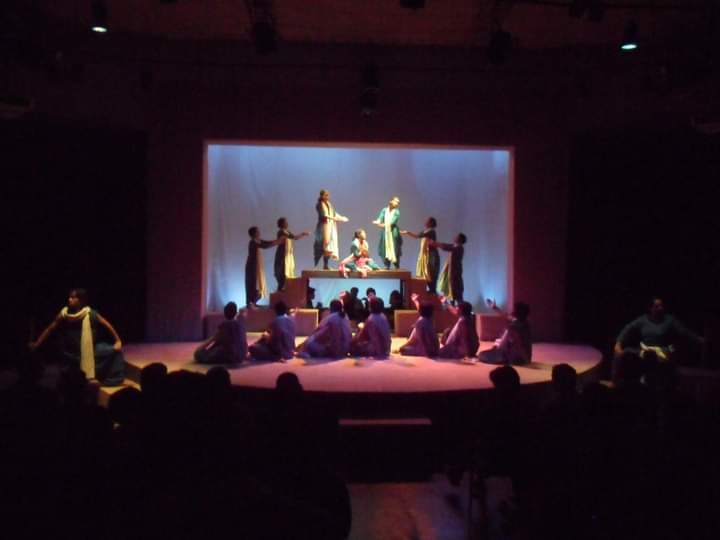Theatre Direction
Dr. Sydur Rahman Lipon’s approach to theatre direction showcases a blend of spatial and universal processes of organizing human action within an agreed-upon creative space, drawing on ethnological, mythical, and contemporary theatre practices. His directorial technique systematically transforms conditional spaces into an invented space, empowering artists to become motivated, free, independent, and spontaneous. Each production functions as both a performative event and an academic exploration, fostering learning through training, workshop, and rehearsal. The portfolio demonstrates his commitment to uniting heritage with contemporary dramaturgy, reaffirming theatre’s role as both art and research.
Nauka Bilash- The Boating Episode
Director: Dr. Sydur Rahman Lipon
Performed and Presented by: 2nd year Students, Theatre and Performance Studies, Dhaka University
A traditional song & dance type Nat-Geet performance. Text- Srikrishna Kirtana- a Hindu mythological manuscript written on Lord Krishna and Radha in medieval Bengal.
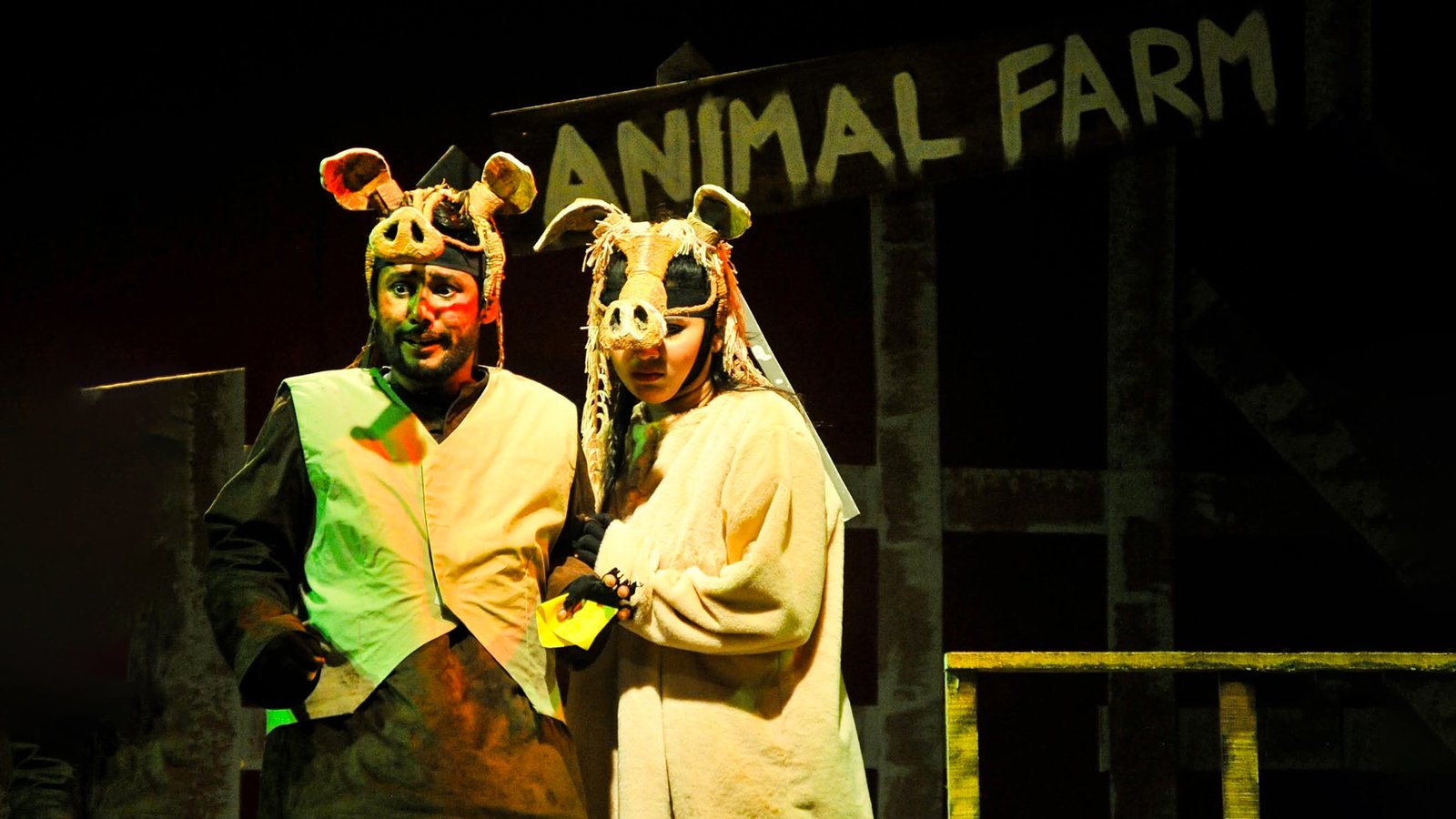
Animal Farm
Novel by: George Orwell
Script: Nazrul Syed
Director: Dr. Sydur Rahman Lipon
Production: Department of Theatre, Tagore University of Creative Arts
This production adapted Orwell’s allegorical novel into a theatrical form that emphasized ensemble movement, symbolic staging, and collective rhythm. By integrating Nazrul Syed’s script with critical interpretation, Dr. Lipon positioned the play as both a literary adaptation and a pedagogical exercise. The direction underscored themes of political corruption, resistance, and manipulation of truth, situating them within Bangladesh’s socio-political framework.
Kritodasher Hashi (The Laughter of a Slave)
Novel by: Shawkat Osman
Director: Dr. Sydur Rahman Lipon
Production: Department of Theatre, Tagore University of Creative Arts
Based on Shawkat Osman’s acclaimed novel, this production explored slavery and oppression as universal socio-political conditions. Dr. Lipon’s direction balanced realism with symbolic gesture, employing minimalist scenography to foreground the human struggle for freedom. By transforming literary narrative into stage performance, the production provided a case study in intertextuality between literature and theatre.
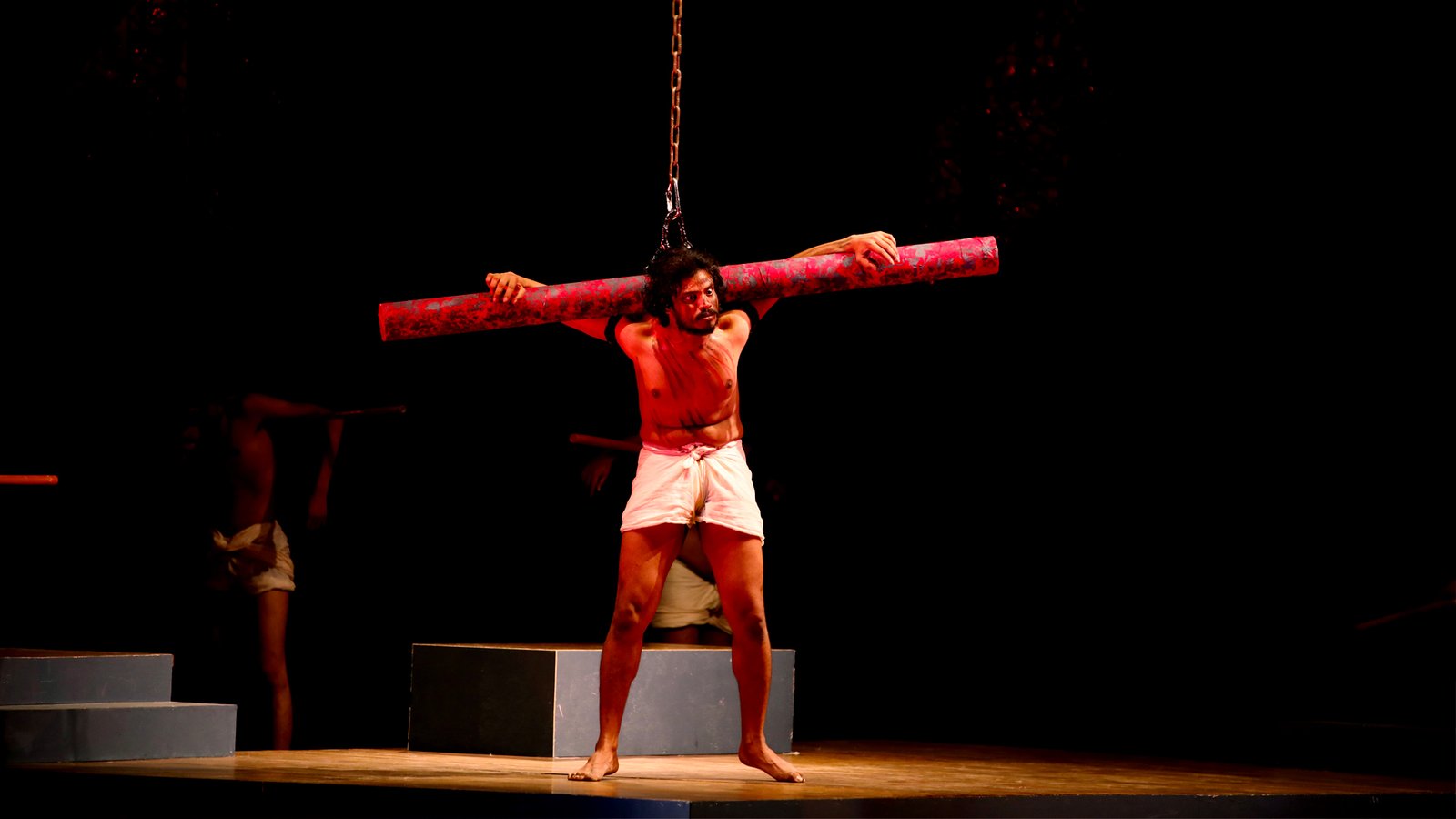
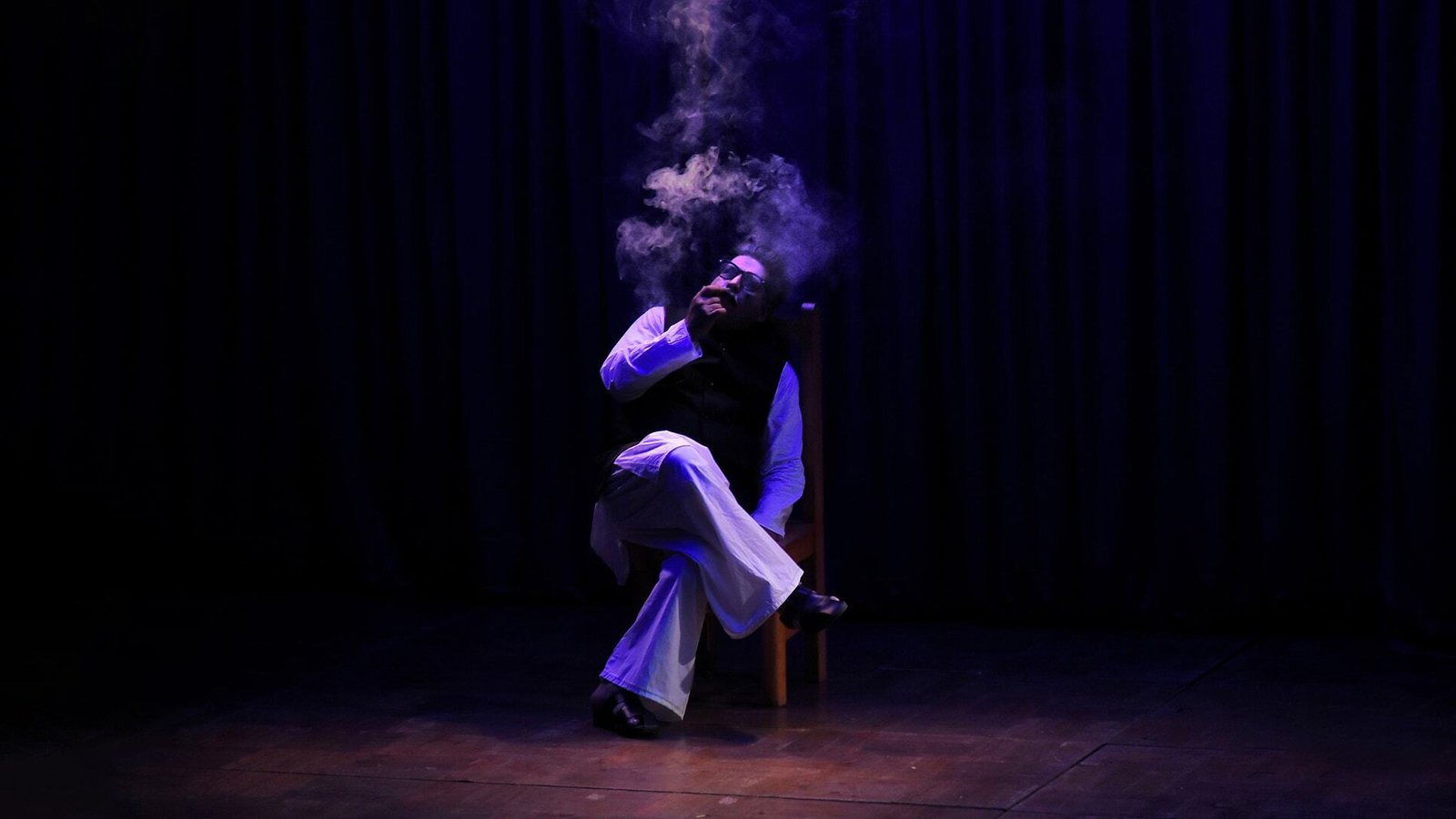
Nishongo Lorai (The Solitary Struggle)
Jatra Pala (Traditional Folk Theatre)
Playwright: Masum Reza
Director: Dr. Sydur Rahman Lipon
Production: Bangladesh Shilpakala Academy
Staged in the jatra tradition, this play dramatized Sheikh Mujibur Rahman’s solitary imprisonment during the Liberation War of 1971. Dr. Lipon revitalized the jatra form by using heightened dialogue, music, and stylized movement, thereby demonstrating its capacity to narrate national memory. The production illustrated how indigenous theatrical forms can function as both historical archive and living pedagogy.
Arupratan (Formless Beauty)
Playwright: Rabindranath Tagore
Director: Dr. Sydur Rahman Lipon
Production: Porishor Art Center, Dhaka
This production reinterpreted Tagore’s lyrical drama as a meditation on aesthetics and metaphysics in performance. Dr. Lipon employed minimalist stage design and stylized movement to foreground the intangible essence of beauty beyond form. His directorial choices emphasized embodiment, rhythm, and vocal expression as tools for philosophical exploration. The production contributed to scholarly discourse on Tagore’s dramaturgy, presenting his text not only as literary heritage but also as a resource for contemporary performance analysis.
Bhelua
Source: Folk Tale from Mymensingh Geetika
Director: Dr. Sydur Rahman Lipon
Production: Department of Theatre & Performance Studies, University of Dhaka
This staging reimagined a tragic folk ballad from the Mymensingh Geetika, highlighting the emotional depth of oral traditions. Dr. Lipon incorporated traditional music, recitation, and improvisational choreography to transform folk narrative into theatre. The production illustrated how ballads operate as performance texts, transmitting cultural memory across generations. By adapting the story for academic performance, he demonstrated the potential of folk material as pedagogical resources within theatre education and ethnological research.

Kamola Ranir Shagor Dighi
Source: Folk Tale from Mymensingh Geetika
Director: Dr. Sydur Rahman Lipon
Production: Department of Theatre & Performance Studies, University of Dhaka
This staging reimagined a tragic folk ballad from the Mymensingh Geetika, highlighting the emotional depth of oral traditions. Dr. Lipon incorporated traditional music, recitation, and improvisational choreography to transform folk narrative into theatre. The production illustrated how ballads operate as performance texts, transmitting cultural memory across generations. By adapting the story for academic performance, he demonstrated the potential of folk material as pedagogical resources within theatre education and ethnological research.
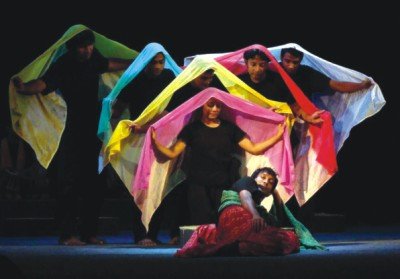
Bhelua Shundary
Source: Folk Tale from Mymensingh Geetika
Director: Dr. Sydur Rahman Lipon
Production: Center For Asian Theatre (CAT)
This staging reimagined a tragic folk ballad from the Mymensingh Geetika, highlighting the emotional depth of oral traditions. Dr. Lipon incorporated traditional music, recitation, and improvisational choreography to transform folk narrative into theatre. The production illustrated how ballads operate as performance texts, transmitting cultural memory across generations. By adapting the story for academic performance, he demonstrated the potential of folk material as pedagogical resources within theatre education and ethnological research.
Shitar Bonobash (Exile of Queen Sita)
Source: Epic Ramayana (adapted from oral folk versions)
Director: Dr. Sydur Rahman Lipon
Production: Department of Theatre & Performance Studies, University of Dhaka
This adaptation dramatized the exile of Sita, blending elements of the Ramayana with folk retellings. Dr. Lipon integrated oral narrative style, traditional music, and symbolic staging to highlight the role of women’s resilience in epic traditions. The performance demonstrated how classical narratives evolve through folk adaptation, becoming accessible across generations. Academically, it functioned as a study in intercultural dramaturgy—showing how ancient epics remain relevant when filtered through local performance forms.
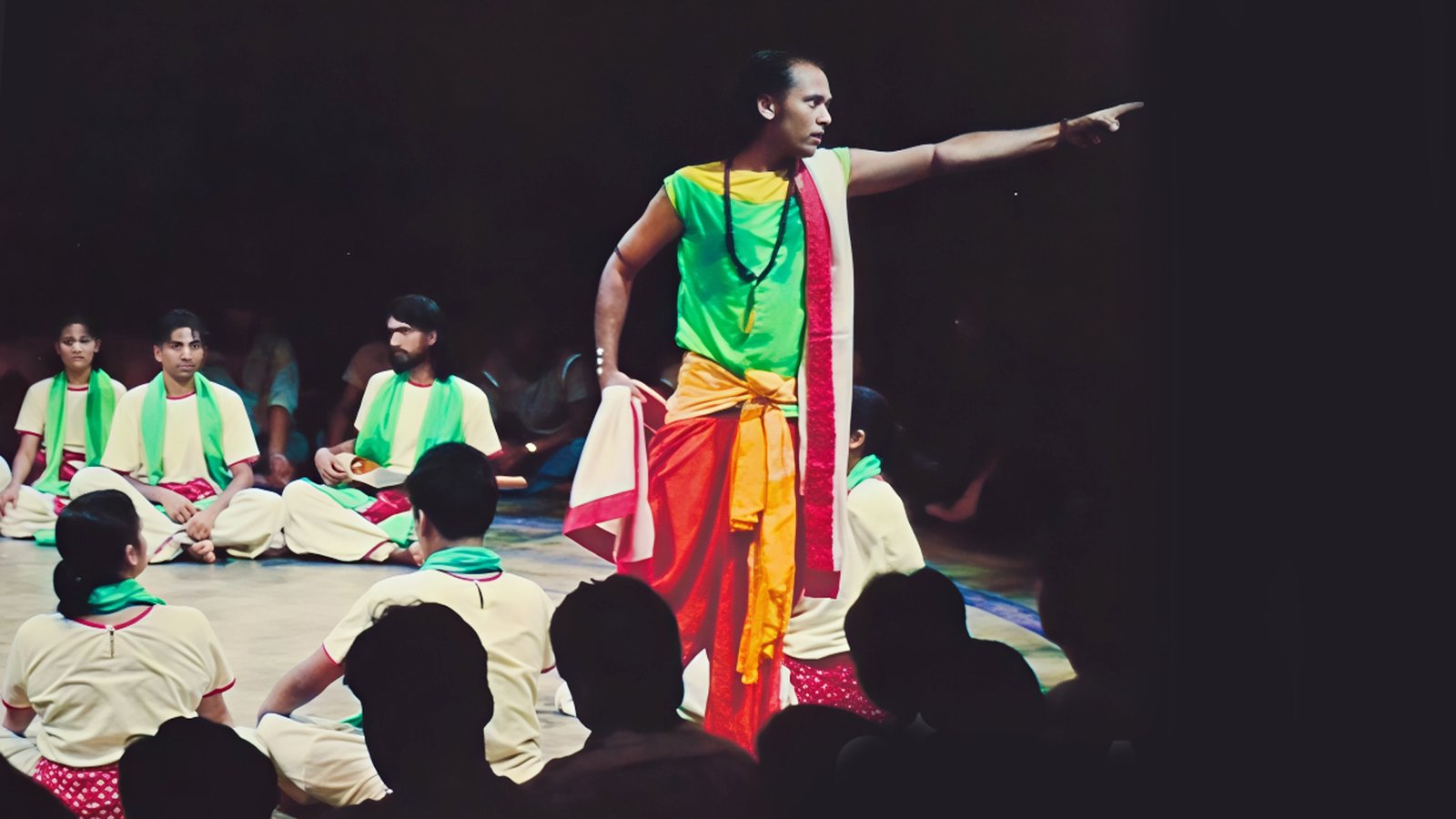
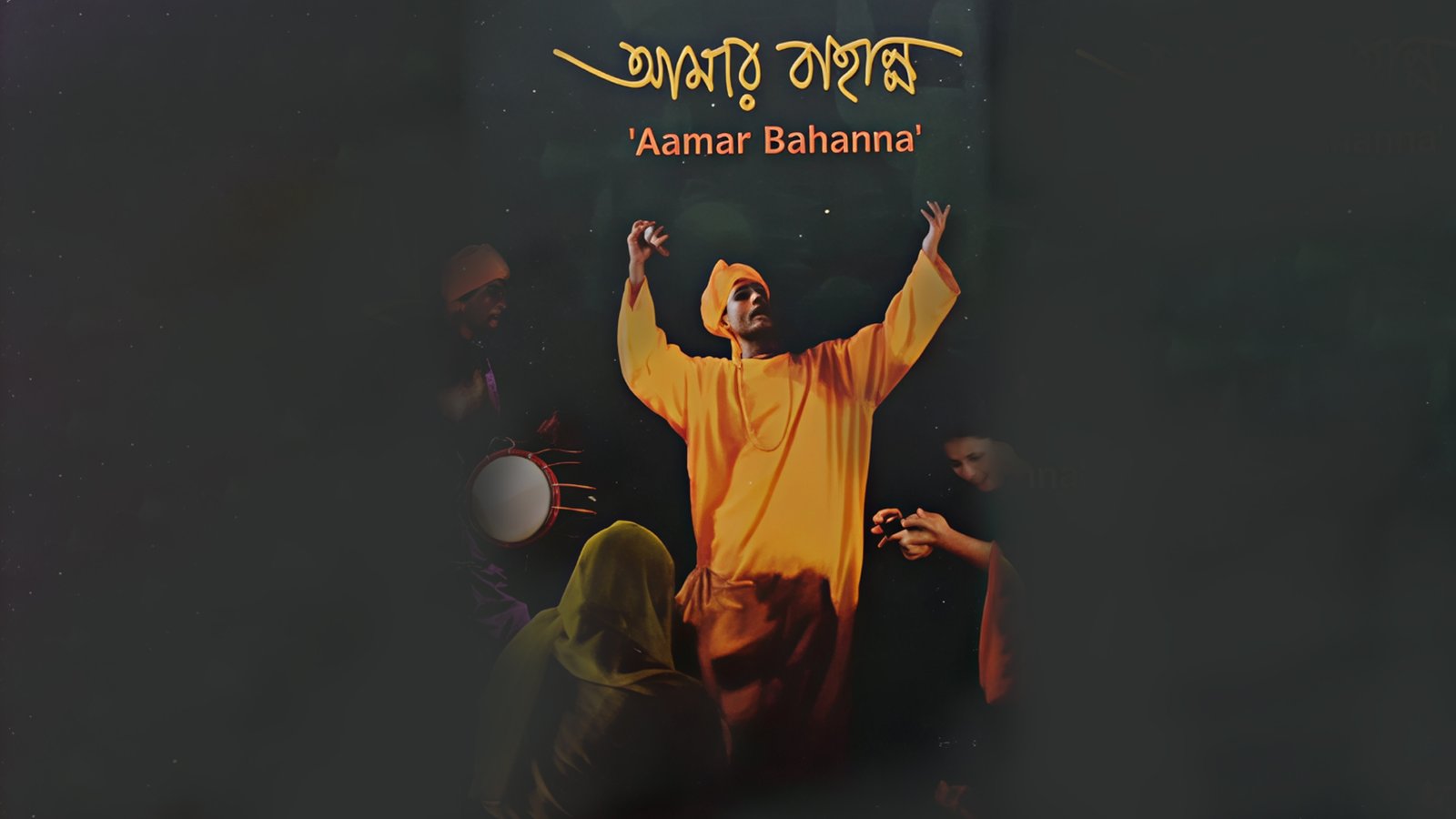
Ammar Bahannya (My 52)
Script: Improvised/Devised Ensemble Work
Director: Dr. Sydur Rahman Lipon
Production: Tarunnya Theatre, British Council Dhaka
This devised play commemorated the 1952 Language Movement through collective improvisation. Dr. Lipon guided the ensemble in transforming historical memory into performance text, combining oral testimonies, symbolic staging, and collective chanting. The work exemplified how devised theatre can function as cultural remembrance, sustaining national identity through embodied practice. Within an academic frame, the production illustrated applied theatre methodology—linking community history with experimental performance processes.
Na Nairamoni
Playwright: Symon Zakaria (based on Charyapada)
Director: Dr. Sydur Rahman Lipon
Production: Dhaka Theatre
This production reimagined the mystical poems of the Charyapada, embedding tantric philosophy into theatrical practice. Dr. Lipon emphasized ritualistic movement, chanting, and symbolic staging to articulate the spiritual dimensions of the text. The performance foregrounded theatre as a site of embodiment for metaphysical ideas, bridging literature, religion, and performance studies. It served as an academic exploration of how ancient manuscripts can be revitalized through contemporary dramaturgy while preserving their esoteric essence.
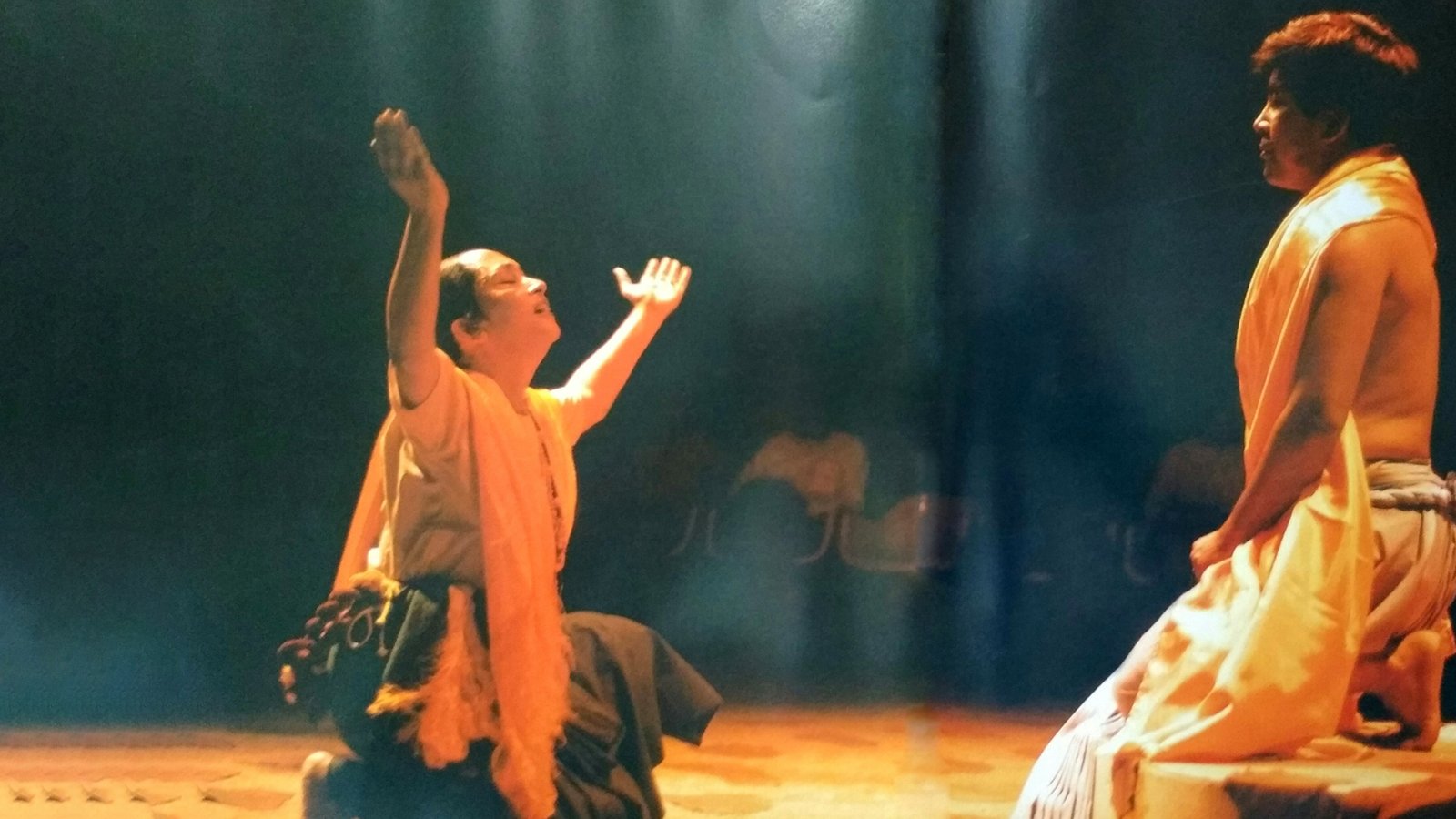
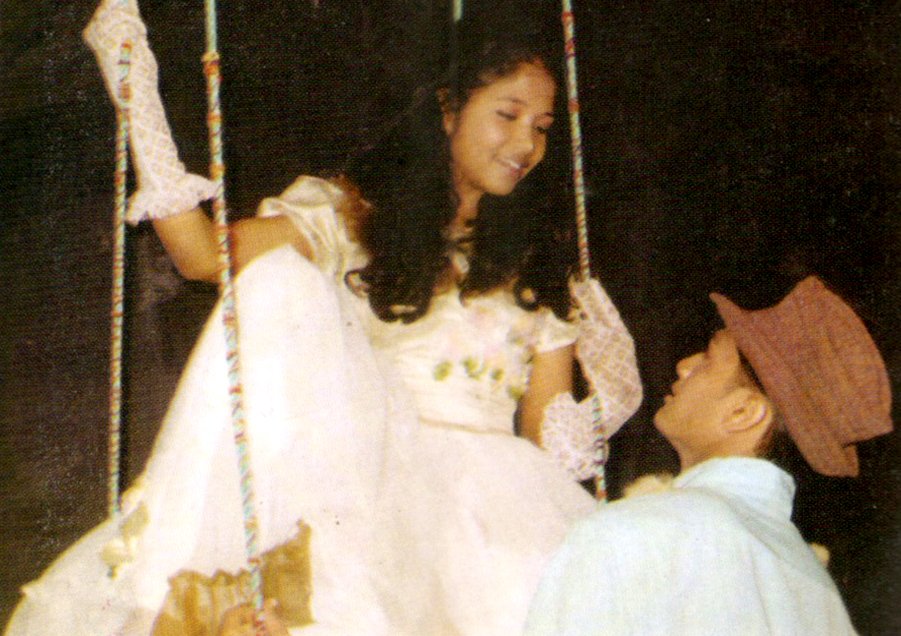
A New Testament of Romeo & Juliet
Playwright: Symon Zakaria (after Shakespeare)
Director: Dr. Sydur Rahman Lipon
Production: Shabdabali Group Theatre
This adaptation reinterpreted Shakespeare’s tragedy within a Bangladeshi cultural framework. Dr. Lipon’s direction recontextualized themes of love, conflict, and social division, blending Western dramaturgy with indigenous performance idioms. The production demonstrated the elasticity of Shakespeare’s works as intercultural texts, adaptable to diverse socio-historical contexts. Academically, it contributed to comparative theatre studies, highlighting how canonical Western plays can acquire new meanings when placed in dialogue with South Asian performance traditions.
Shuru Kari Bhumir Name (In the Name of Earth)
Playwright: Symon Zakaria
Director: Dr. Sydur Rahman Lipon
Production: Bodhon Theatre
Symbolically rooted in the Liberation War of 1971, this play used allegory and abstraction to articulate the relationship between land, people, and resistance. Dr. Lipon’s direction foregrounded physical imagery, ensemble performance, and metaphorical design to evoke collective memory. The production highlighted the ecological and existential connections between theatre and national identity. In academic terms, it illustrated how symbolic dramaturgy can translate historical trauma into aesthetic experience, merging political history with performance art.
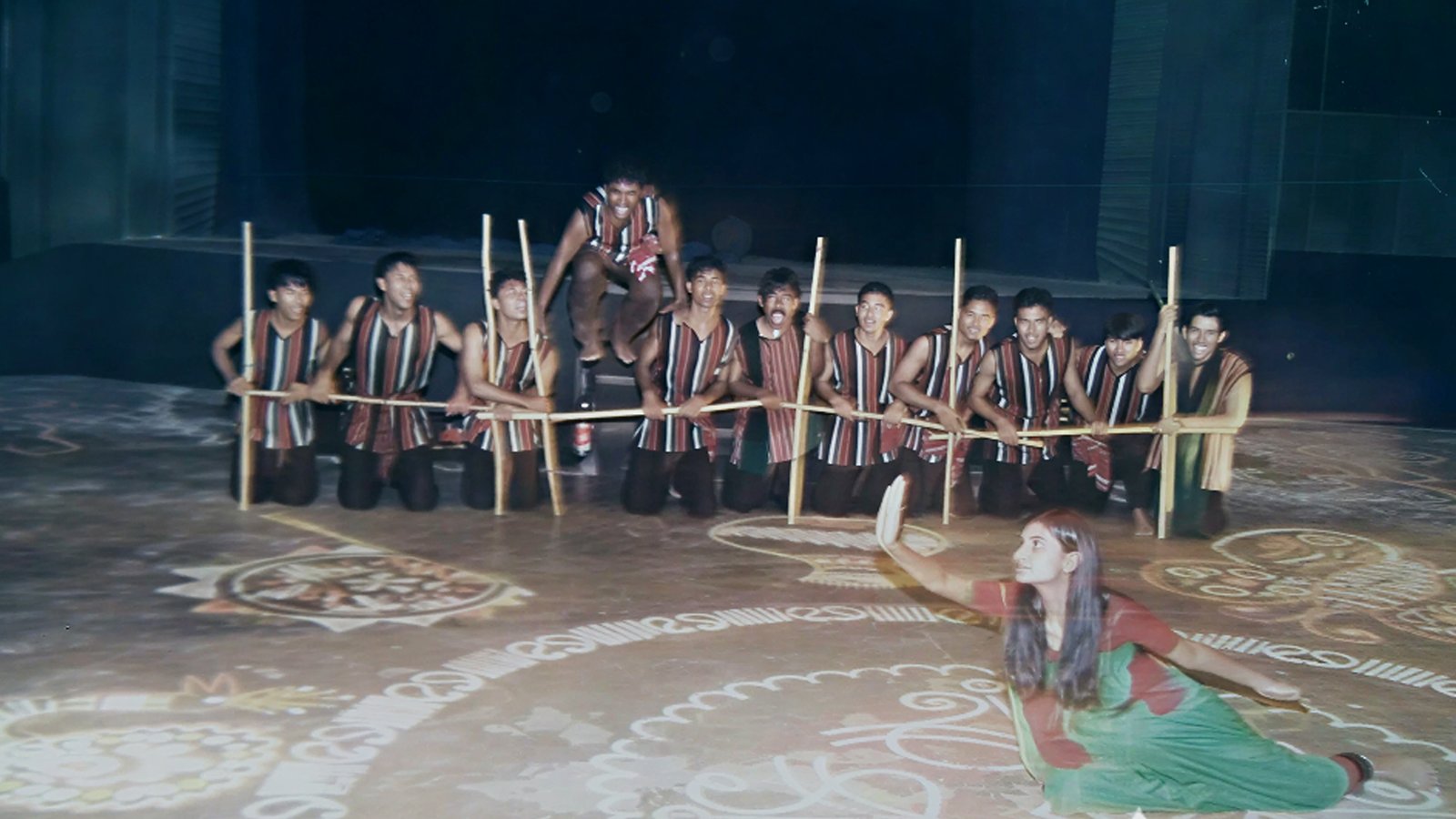
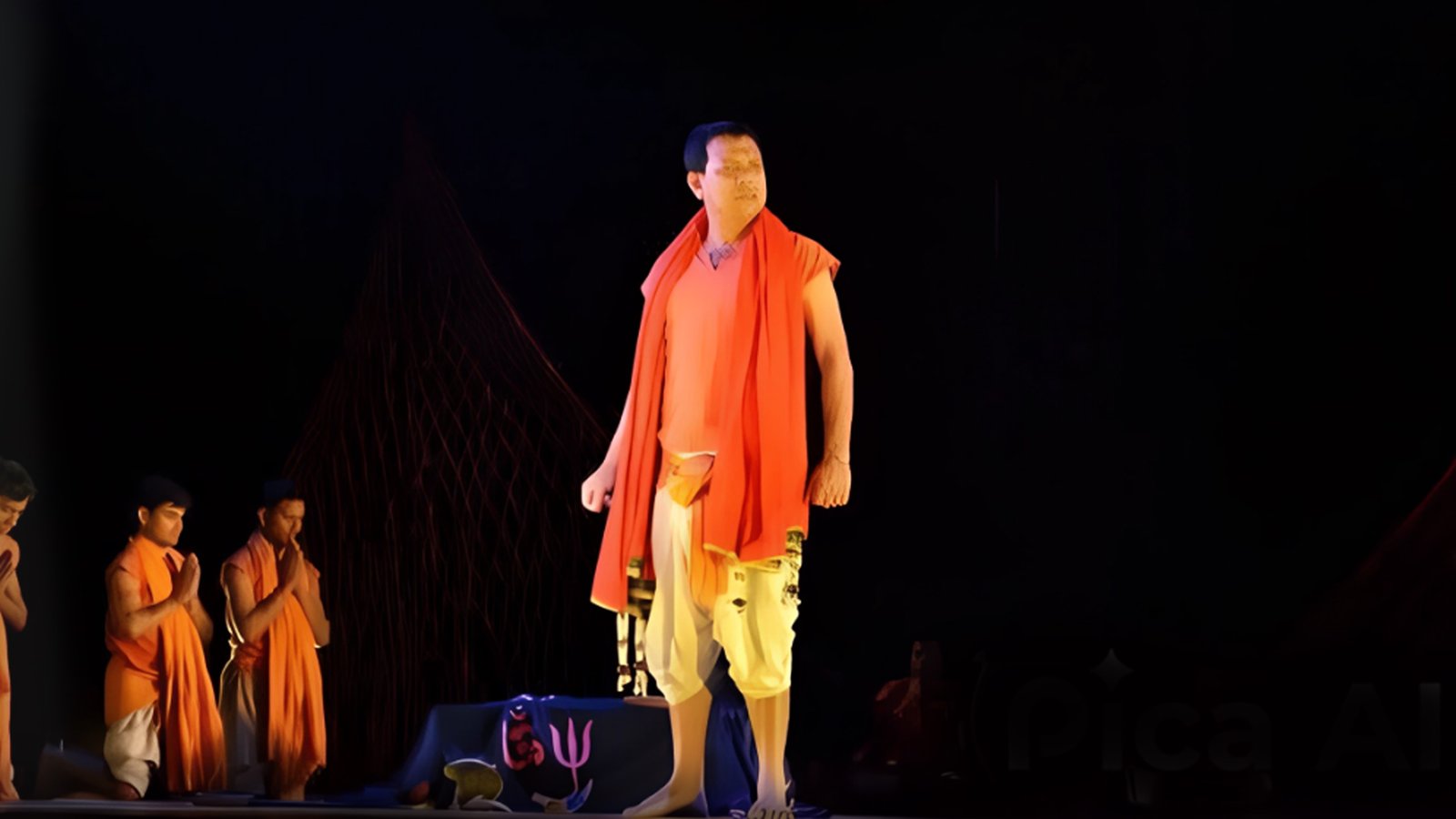
Kaibarta Gatha (Tale of the Fishermen)
Playwright: Taufiq Hasan Mayna
Director: Dr. Sydur Rahman Lipon
Production: Bogura Theatre
This folk-inspired play recounted the struggles of fishermen against oppressive rulers, framing resistance as both social and cultural action. Dr. Lipon employed narrative song, stylized acting, and ritualized gesture to reconstruct the historical memory of subaltern communities. The direction highlighted theatre’s role as a repository of marginalized voices and collective struggle. The production became an academic case for how folk narratives function as performative histories, embodying resistance within the aesthetics of indigenous performance.
Malua Shundari (Beautiful Malua)
Source: Folk Ballad of Bangladesh
Director: Dr. Sydur Rahman Lipon
Production: Anonda Nattya
Based on a popular folk ballad, this staging foregrounded rural love and destiny through music, improvisation, and oral performance style. Dr. Lipon’s direction highlighted the affective power of folk narratives, using aesthetic devices to transform oral tradition into theatrical form. The production reaffirmed the continuity between village performance practices and modern theatre, offering audiences an experience rooted in collective cultural identity. Academically, it served as an exploration of folklore as a living heritage within applied theatre practice.
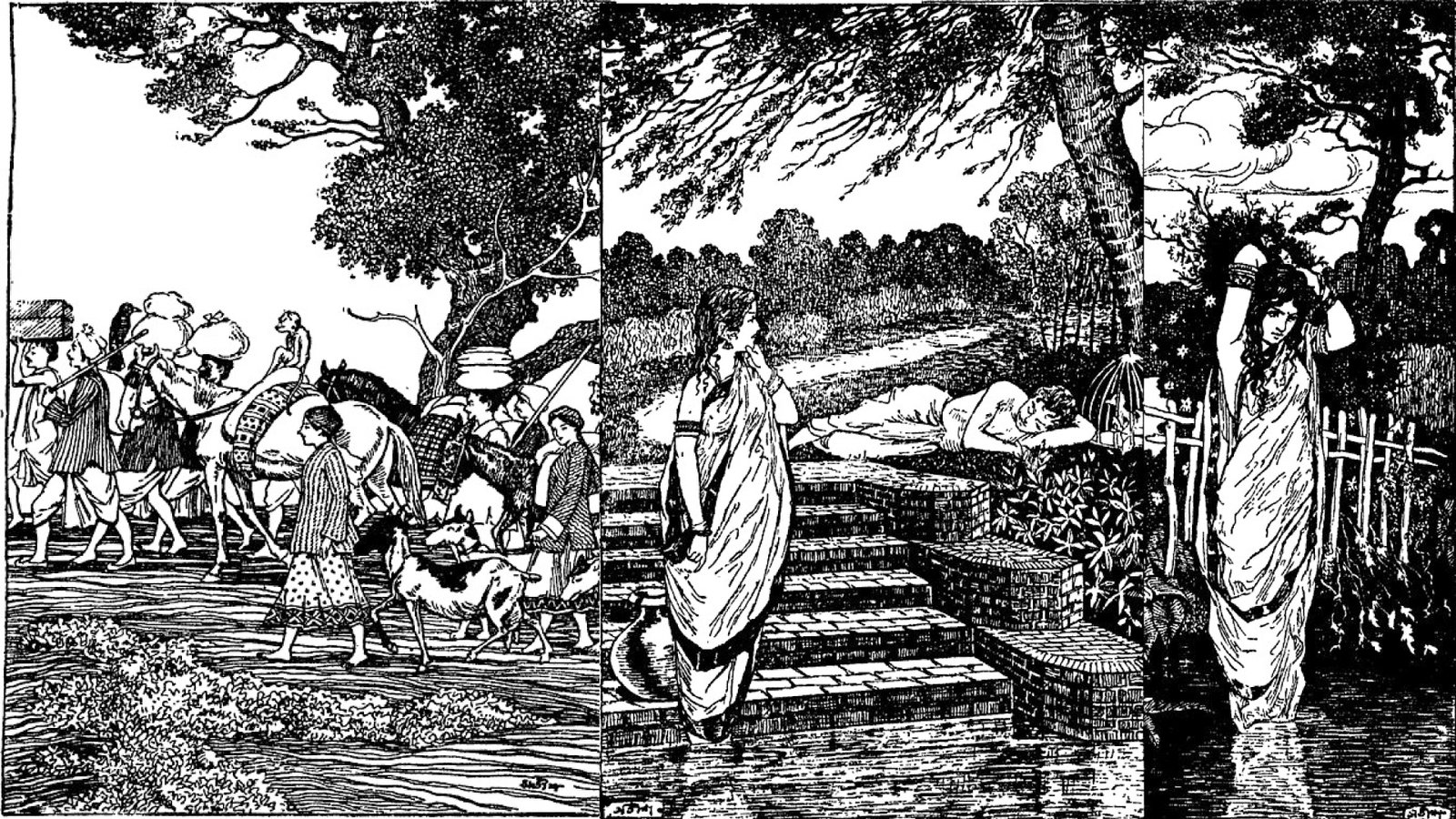
Directorial Assistance
Pakhider Bidhan Sabha (Conference of the Birds)
Playwright: Farid Uddin Attar (Mantiqu’t-Tayr)
Script: Shaman Moishan
Director: Ahmedul Kabir Young
Role: Music design
Production: Department of Theatre & Performance Studies, University of Dhaka
Dr. Lipon contributed as music designer for this Sufi allegorical drama, ensuring that the spiritual depth of Attar’s text was articulated through rhythm and sound. His involvement highlighted how music functions as a dramaturgical tool within mystical theatre traditions.
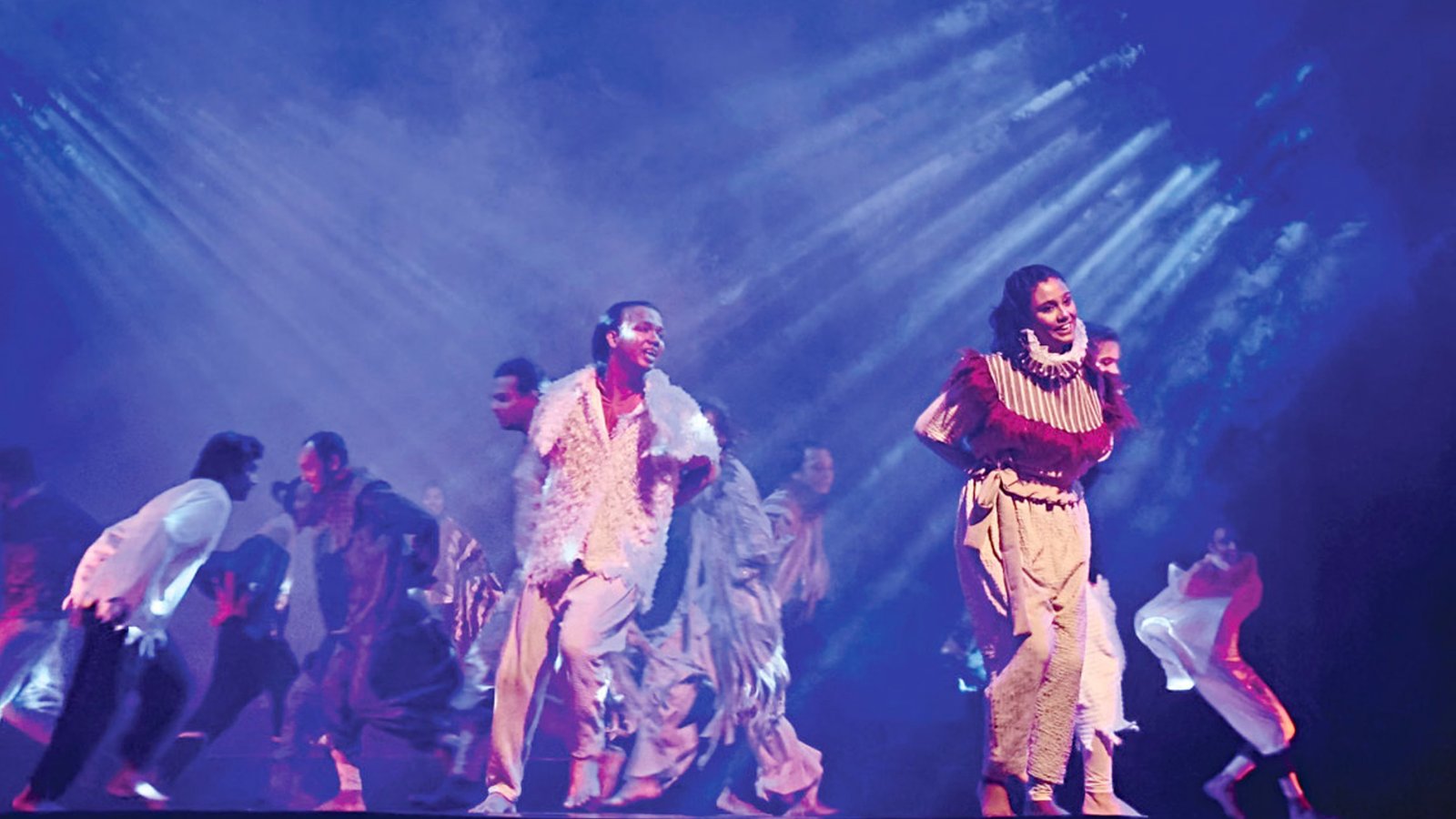
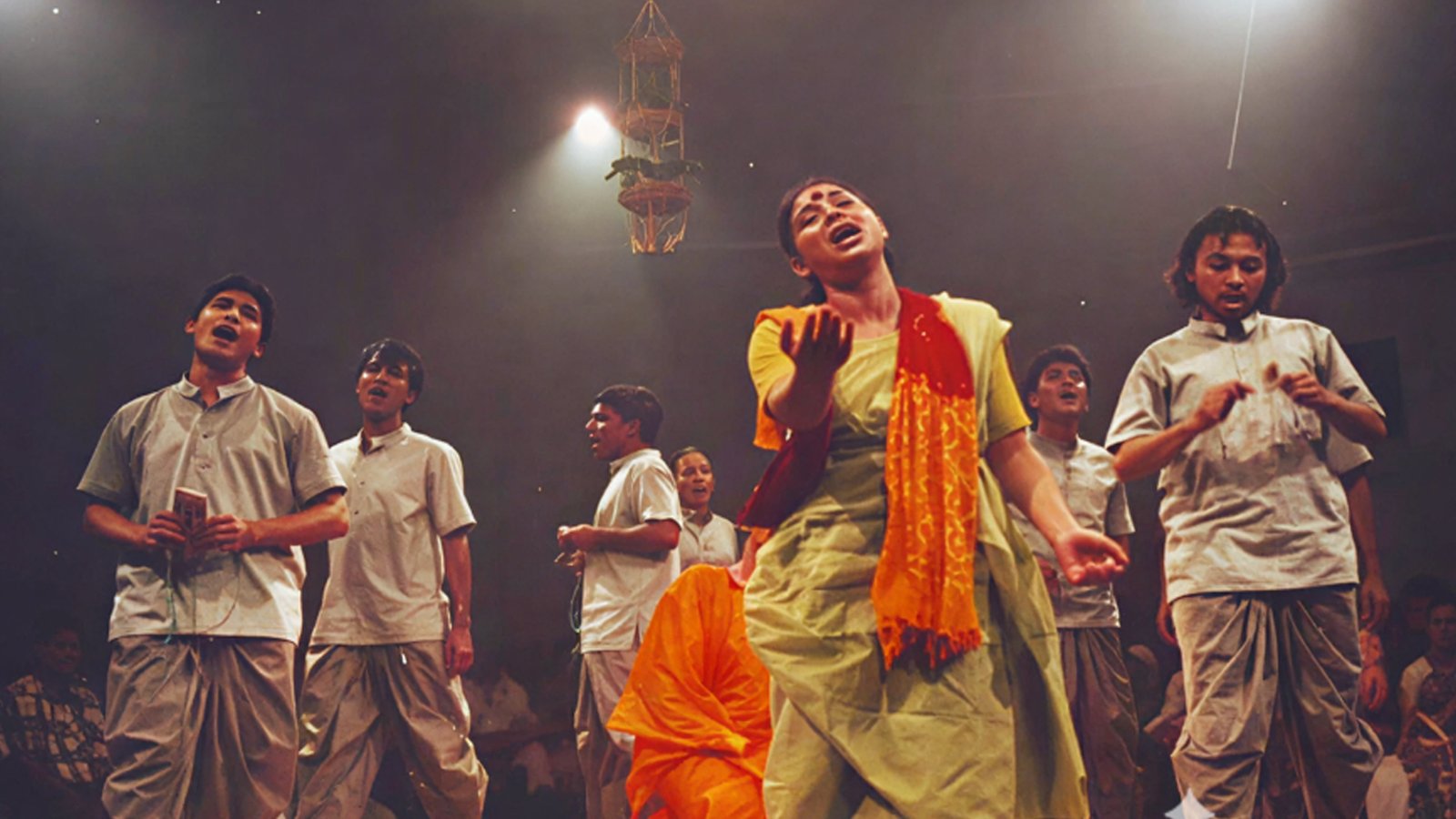
Behular Bhasan (Journey Against the Stream)
Source: Medieval Bengali Tale of Goddess Manasa
Director: Dr. Syed Jamil Ahmed
Role: Directorial Assistant
Production: Department of Theatre & Performance Studies, University of Dhaka
In this production of the Manasa–Behula myth, Dr. Lipon assisted in adapting a religious manuscript for contemporary performance. His role supported exploration of ritual, myth, and folklore as performative texts in theatre pedagogy.
The Mouse Trap
Playwright: Agatha Christie
Director: Dr. Israfeel Shahin
Role: Performer / Directorial Assistant
Production: Drama Club, North South University
Here, Dr. Lipon gained cross-cultural training by assisting in staging Christie’s classic detective play. His engagement reflected the adaptation of Western dramatic structures within Bangladeshi university theatre contexts.
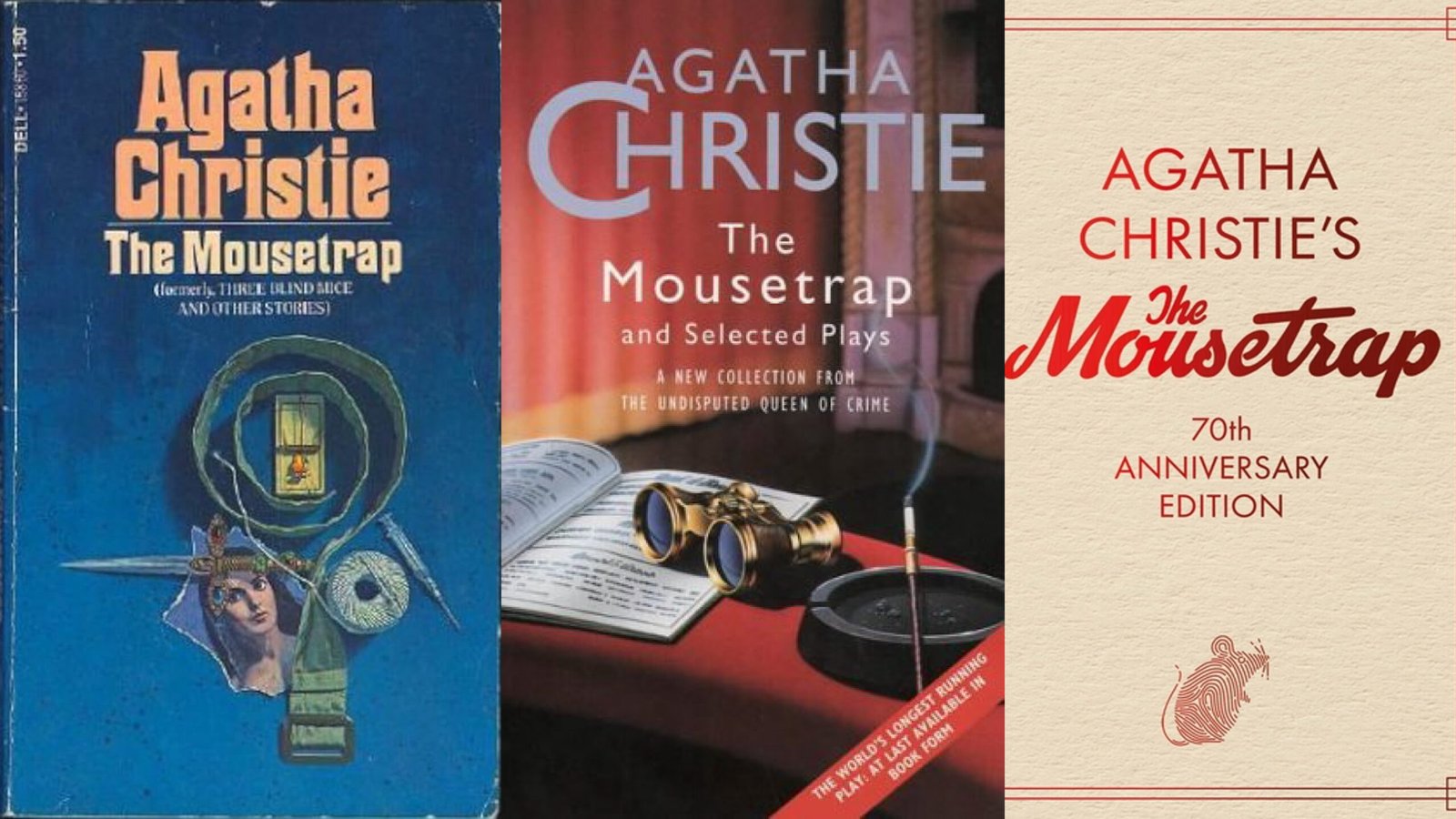
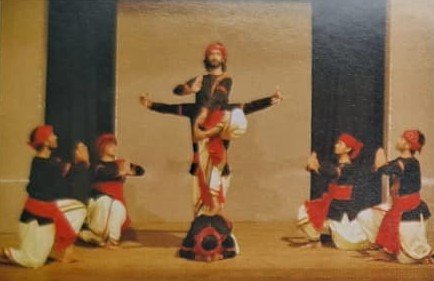
Uru Bhangam (The Broken Thigh)
Playwright: Bhasa (Sanskrit Dramatist)
Director: Wahida Mallik Jolly
Role: Directorial Assistant
Production: Department of Theatre & Performance Studies, University of Dhaka
This Sanskrit classic was staged as part of intercultural training. Dr. Lipon’s involvement allowed him to examine classical Indian dramaturgy in practice, enriching his ethnological approach to theatre studies.
Bunahas (The Wild Duck)
Playwright: Henrik Ibsen
Director: M.K. Royna (India)
Role: Directorial Assistant
Production: Centre for Asian Theatre, Dhaka
Working under an international director, Dr. Lipon contributed to Ibsen’s canonical text. This role exposed him to Scandinavian dramaturgy, offering an academic perspective on intercultural rehearsal processes.
